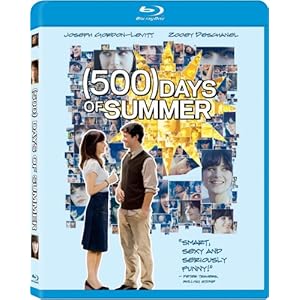
I kind of like romantic comedies that aren't really romantic comedies. I think Annie Hall is a great example of one, and so is (500) Days of Summer. They're both really funny and sweet, and have interesting romantic stories. But they aren't romantic comedies. Because that classification requires the two leads getting together at the end, right? And that's not what we have here. Right from the start we know that Tom isn't going to end up with Summer, because of the whole 500 day thing. The only surprise was how early in that period they actually break up, with the rest dealing with how he responds to his devastation. The movie jumps back and forth in time constantly, using the technique to establish his miserableness after it's over, show how they got together, and then cleverly reveal over time what helped lead to a dumping that he apparently didn't see coming. It's a great script, and a well put-together film with good acting by the two leads. One of my only issues with the whole thing really is the slightly silly title.
The film walks a precarious tightrope the entire time, as it really strives for a specific mindset, with lots of stylish touches and gimmicky scenes throughout. A split-screen is frequently used to show what's happening in two different locations, or in one particularly interesting sequence, two different realities. The whole 500 days thing permeates the film, as we're constantly told exactly how many days into the relationship we are at a given moment, which provides comedic juxtaposition and assists the storytelling. There's some weird stuff going on, and if you combine it with the two main characters' indie music sensibilities (they like The Smiths and he sings Pixies at a karaoke bar and discuss their favorite Beatle) and the character of Tom's sister, it could all become really cheesy and silly quickly. Only the last part really bothered me at all though, and I thought the way the chipper mood of the two when they're together clashed with his depression when it's over was smart. It manages to be emotional without getting too sappy, because it's easy to see how much duller his life is without her.
The only thing I know about Marc Webb is that he's directing the too-soon Spider-Man reboot, but he seems to have a handle on filmmaking here. He juggles managing the actors with getting all those quirky bits in, and the style never gets in the way of the story. My man crush on Joseph Gordon-Levitt continues, as he does a great job with the material and comes off as likable despite some of his actions being less than positive or justifiable. Zooey Deschanel is good too, being instantly desirable when she's supposed to and coming off well despite the one-sided nature of the film's perspective. I don't understand why Chloe Moretz can never just play a normal little girl, and her wise-beyond-her-years little sister act didn't quite work for me here. She's not objectively bad, though. Clark Gregg, who's most recognizable these days as Agent Coulson in all of the Marvel movies, is also likable as Tom's super-cheerful boss. I've talked before about how sometimes films don't need to be perfect to just be effective emotional experiences, and I think that definitely applies here. A lot of the individual elements might have bugged me on their own, but all together it's a really slick and entertaining film. Not a romantic comedy, but a funny and charming movie nonetheless.
Thursday, July 28, 2011
(500) Days of Summer
Wednesday, July 27, 2011
Aqua Unit Patrol Squad 1 - Season 8

The funniest thing about the overhaul Aqua Teen got this year is how little it actually affected the show itself. Renamed Aqua Unit Patrol Squad 1, the show has a new theme song, a new intro with stylish visuals, George Lowe announcing the episode titles, and has been relocated to rainy Seattle. Once the show actually starts though, it's basically exactly the same. Despite apparently moving, the squad's home looks exactly the same, and Carl still lives next to them. They were back to being detectives for about an episode before it was completely forgotten. The whole attempt to change the show significantly was a ruse, and a funny one. The show didn't need to change, really, and if people don't like it, there's not a lot that's going to affect it. So Aqua Unit Patrol Squad 1 is Aqua Teen Hunger Force, and that's fine by me.
Not that I really loved this season more than the last couple. I believe I said last time and maybe even the time before that the show leans a little too far towards weird instead of just funny these days, and that's not really less true here. It's still a funny series, we're not talking about anything too far out here. It's just less consistently laugh-out-loud hilarious. It's hard to keep coming up with ideas after a decade, especially with something so off-the-wall by default as a cartoon about giant talking fast food. The primary issue probably is that they're just not as good at coming up with new characters that are as entertaining as in the beginning. A lot of the time the new characters only exist to react to whatever messed up thing Master Shake is doing, or their entire schtick is a pretty familiar case of an unusual thing talking about an unusual situation as if it's totally normal. Which is cute, just not as inspired as guys like the Mooninites or Happy Time Harry. I did really like the season finale, which brought back the detective idea a little bit with a parody of every overly-twisty crime drama ever made. It's far from the best stretch of episodes the show's ever had, but I had a good enough time with it nonetheless.
Tuesday, July 26, 2011
Captain America: The First Avenger

Sometimes you see a movie that makes you forget what the point of the medium is. Are people actually trying to tell stories? Or do they only ever get made to make money. It's probably somewhere in the middle for everything, and of course certain films have more artistic purpose to them than others. At first, this whole Marvel project leading up to next year's The Avengers was exciting, and it didn't interfere much with the movies themselves. Iron Man and The Incredible Hulk were pretty much regular super hero movies, which happened to include a scene teasing the eventual conclusion of the undertaking. Last year with Iron Man 2 though, the Avengers subplot grew visibly, leading some to think the movie was overstuffed and aimless (I still liked it). And this year with Thor and now Captain America, we're actually seeing hints of what the plot might actually be about, as the project threatens to wipe out any individual accomplishments of the other movies by themselves. Captain America's whole plot was probably adversely affected by The Avengers, as they had to turn Steve Rogers into a superhuman, get him through the war, and then have him wake up in the modern day within two hours. When all is said and done, will this whole thing actually be looked back on as a major triumph of long-term genre filmmaking? Or is just a way to make a lot of money, as you hype up a big event film and then hook people into buying tickets for a bunch of other movies in the lead up to it?
The real question though, is whether people care. I don't think I do. I think most people today are content to have their summer action movies be loud and colorful, and as far as that kind of movie goes, Captain America is more than adequate. It's not perfect, but I enjoyed myself while I was watching it about as much as most big action movies I've seen, assuming we aren't talking about ones with actual inspiration and creative intent behind them. And that's totally fine. Joe Johnston hasn't had the most distinguished career, but he knows what he's doing, and he manages to shoot this film with a nice traditional style and keep the action mostly coherent without an over-reliance on special effects (though things like Chris Evans' face on a scrawny body or him running with super speed sometimes definitely look silly). Evans is totally adequate as Rogers, both as a nobody and as a hero. The problem here is that Evans' best asset is that he's charming, and his character isn't really allowed to be. He's awkward and duty-driven and righteous. I still think he's likable enough to hang a movie on though, especially when the supporting cast is as helpful as this one.
As always, Hugo Weaving does an excellent job in a genre role, playing the villainous Red Skull with a solid German accent and a real menage. Tommy Lee Jones' character is sort of a standard gruff military leader, but he's Tommy Lee Jones and the part works out really well. I especially liked his interrogation scene. A couple TV actors who have done solid work there get a bit of big screen time here, including Hayley Atwell, who's a good romantic foil for Evans and has a look that fits in with the image of beauty for the period, and Sebastian Stan who brings life to Bucky Barnes in an enjoyable way. Stanley Tucci is a lot of fun in a few brief scenes as the inventor of the super serum, and I just loved the image of Neal McDonough with a big mustache and a shotgun as Dum Dum Dugan. Put it all together and you have a nice, brisk World War II movie, which happens to feature a legendary cube of immeasurable power, anachronistically powerful technology, and a guy running around with the world's best shield.
The biggest issue I had with the film is that the structure of the story feels wrong. It's not a huge deal because it's just a popcorn flick and most of the individual scenes hold together well, but it's definitely noticeable. Not every story has to adhere to the standard three act structure, of course, but if they don't the structure they use instead should be clear. The problem with Captain America is that it still seems like a three act movie, it just forgot the second one. It takes a long time for Steve Rogers to become the man we know. First he has to be given a chance to join the military, then he has to be selected for the super serum test, then he has to prove he can be a soldier with it, and then he has to establish a goal for the rest of the film. Meanwhile, we're also setting up the Red Skull and what his goal is to win the war. This is all stuff that the film tries to stuff into what should be the first act, and it takes over an hour. By the time it's all done, the script seems to realize there isn't time to tell a proper story, so they stuff a lot of implied action into a slick but unsatisfying montage, and then proceed quickly to the proper third act. It's just sort of sloppy.
I think if less time was spent between Steve getting his powers and proving his worth as a soldier, things would have been smoother. There's this whole section where he's being used for propaganda which is amusing on its own, but drags down the pace of the story in retrospect. It wouldn't have taken that much to fix the whole thing, which makes the problem kind of irritating, but like I said, being as the film only really exists to pump people up for The Avengers and sell tickets, it's not a major one. I just wonder what a Captain America movie that existed only for itself would have been like, because I think there's plenty of potential for one. I'm curious if all the planned post-Avengers sequels will be allowed to do their own thing, or if they'll just be serving to build up a sequel to The Avengers itself.
Monday, July 25, 2011
Okamiden
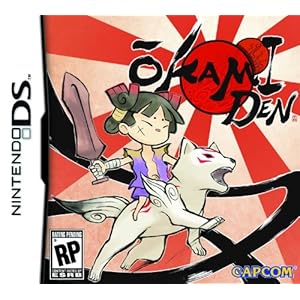
I think Capcom would have been better off making a straight sequel to Okami. The concept of Okamiden as a handheld companion to the original game, taking place in many of the same areas but putting twists on them and telling a sort of tangential story is fine. But it took me over twenty hours to beat and has sections that can for many minutes without save points, which is sort of ridiculous for a handheld game. The game's reach exceeds the intended scope of a portable experience and if anything the game wears out its welcome faster than its notoriously long predecessor. The actual playing of the game and telling of the story is fine, but there are issues with the pace that bog down the experience a bit.
In Okamiden you play Chibiterasu, the young offspring of Amaterasu, the wolf goddess from the first game. Only nice months after evil was supposedly vanquished, it has returned, and you are called into service to find some friends and use the celestial brush to get rid of it once more. The brush is a natural match for the DS' touch screen and stylus, and the system definitely works more smoothly than it did on console. You don't start out with many techniques, but you quickly pick some familiar ones up, along with a few new skills, mostly associated with specific partners who ride on your back and can help you fight certain enemies or cross certain dangerous terrain. The game's look handles the transition to the DS hardware remarkably well, definitely with a blockier style than before but with the general aesthetic in place, and even a usable camera and only a few issues with slowdown. The game design is necessarily a little more narrow and boxed off, but it's hard to call the platform change anything other than a success.
So the game progresses as you revisit some of the locations from the original and discover new caves and dungeons to explore within them, while accompanied by various children who mostly happen to be related to or at least resemble existing characters. They replace Issun as your connection to other humans, and help in combat and puzzle solving. The story starts out nice and simple, feeling like a regular little adventure, though things get more dramatic later on when the villain is revealed, and eventually actually surprisingly touching towards the end. I would have really liked the game a lot of it actually wrapped up about fifteen or sixteen hours in like it felt like it was going to, but things kept repeatedly getting tacked on that I need to finish, including an entire additional flow-breaking dungeon to finish along with a new kid to worry about. Eventually it got back on track, but then a twist happens that essentially negates everything you did in the last couple hours, and then there's still another whole last section involving a pretty uninteresting set of challenges and a bunch of repetitive combat. The fighting is the thing that feels the most dumbed down from the PS2 game, and I mostly avoided it where I could, since the only reward was cash that I didn't really need to spend. So being forced to slog through a dozen battles without any of the nifty puzzles breaking it up was a disappointing way to wrap up the game.
And then after finishing the final boss fight, the last cut scene lasts for twenty five minutes before the credits start. Again, this is a game for a system that's most useful feature is it can be played on a bus. I feel like more games I've played in the last few years haven't known when to quit than they did before. It's not about how long the story lasts, as I said twenty hours is long for a DS game but not on its own that out of control. The issue is the pace. If the story has taken a turn and feels like it's racing towards a conclusion, then that conclusion should be brief in comparison to the preceding sections of the game. In the past I've lamented games where what is essentially the third act is over too quickly, but that was probably wrong. If something feels like it's the climax, it shouldn't have the same pace as the rising action. It's a feel thing, so I don't mind a little stretching here or there, but Okamiden definitely didn't know when to quit, and that soured my perception of the whole thing a bit. It's a cute, solid little action/adventure that works quite well on the hardware, but it does have some problems weighing it down.
Friday, July 22, 2011
A Dance with Dragons
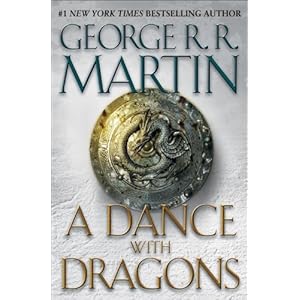
I think if I had been reading this series all along and had been waiting for this book for six years, I'd be a little disappointed. Luckily, I was waiting for less than two. While a bit of that feeling is still there, overall I loved the book while I was reading it and just enjoyed seeing more of that world. The Game of Thrones TV series is a worthy adaptation, but there's only so much you can show in ten hours, and getting back into the books, I was reminded of the almost absurd amount of detail within the writing. People make fun of George R. R. Martin for being fat, and he calls himself a "talented eater". His passion for food definitely shows up in the book, as pretty much every meal a character gets within sniffing distance of is described in detail. It's something I didn't really notice before, but after it was pointed out, it was kind of funny to see how much time is spent on just what people happen to be eating while wars are planned and secrets are revealed. It's not just the food that gets a lot of attention, pretty much everything you could want to know about the world is spelled out, from family trees to clothes to heraldry, sometimes repeatedly. It could have resulted in tedium, but I love the setting as much as anyone, and I love the focus it gets in these books.
The story definitely slowed down during the fourth and fifth books, which take place mostly in parallel. After a certain point characters and locations from the fourth book start appearing again, though generally it's just to give us a quick update on their situation before jumping back to the main threads of the story in this volume. The problem with the book is not the world count, or the increasingly large number of subplots sprinkled all over the world, it's just that not quite enough forward progress seems to be made in most areas. I think these two books came out of a planned skip forward in the series' timeline that ended up not happening, and there's a feeling of waiting in many of the characters' stories. Some POV characters are in positions of authority and mostly just try to manage their current situations, others make an expected progression in their personal arcs and then just drop out of the book completely.
There doesn't seem to be much of a climax to the story, things do get pretty exciting and even significantly game-changing near the end, but because of the staggered way all of the plots end up finishing, it sort of feels like Martin just decided to stop writing at a certain point after failing to find a suitable climactic event. I know he has a fairly significant amount of the next book already written, and I think he probably just cut it off to keep it to a semi-reasonable word count. Not that the cliffhangers he set up aren't intriguing and good fodder for speculation during the wait for the next book, it's just the way the story has swelled over the years make it hard to have everything seem totally cohesive. All that said, I had a great time reading the book, and continue to hope and believe Martin has some sort of plan that he's driving toward. He recently admitted that he might have to write three more books instead of two to wrap up everything, but if that happens, I'll try to appreciate the extra time spent in Westeros more than I rue the extra years of waiting for the ending.
Thursday, July 21, 2011
Movie Update 11B
I couldn't fit all the labels I wanted into one post yesterday, so here's even more movies. The label issue was so severe I couldn't even neatly divide the films into themes! Labels!
The Earrings of Madame de...
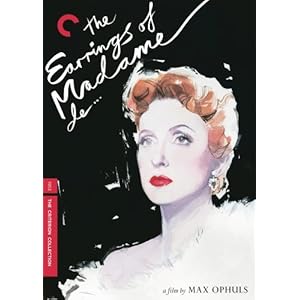
A fancy French movie about fancy French people. There's nothing really wrong with this movie, I just didn't find a whole lot to love about it. The cast is solid, including Vittorio De Sica as an Italian man that the leading lady falls in love with, who I know better as the director of The Bicycle Thief. This movie doesn't really have the power of that one, but tells the story of a married woman who becomes attached to a pair of earrings she sold after her lover buys them back for her. My favorite part was just the way the film played with the idea of never actually giving you her name. Otherwise, it's a nice little romantic drama, mostly worth the time it takes to watch.
High Noon
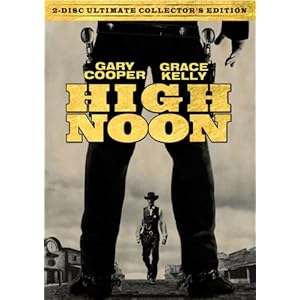
High Noon is sort of the 24 of the 1950s. I liked it a lot more than I really expected. It has a similar problem to the last Gary Cooper movie I saw, where he was too old for his love interest, in this case Grace Kelly before Alfred Hitchcock got to her. In this case it didn't really hurt the film though, because his character is more likable and the story isn't about their relationship. It's about a lawman ready to retire, but dragged back into conflict before he can, as the whole town seems to turn against him during his darkest hour. The film is mostly in real time, as everyone anticipates the arrival by train of a criminal he had originally put away, apparently back for vengeance. He tries to rustle up a posse, but doesn't get the support he anticipated, and there's a fantastic sense of concern and dread as he runs out of options while the clock slowly ticks towards his likely demise. It's a pretty realistic movie, with an ending that has heroism without being too dramatic or fantastic. One of my favorite Westerns.
The Rules of the Game
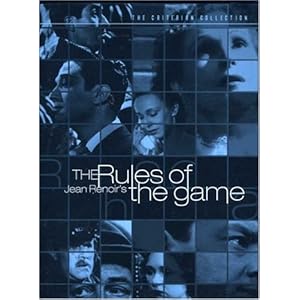
I'm not sure anyone from the 30s had a better idea of how to shoot a movie than Jean Renoir. This is another fancy French movie about fancy French movie, although it's one I found more to latch onto in. It's an ensemble piece about the fickle lives of aristocrats, as they bounce from lover to lover without realizing the pain they cause. Renoir himself is among the cast, and they do a solid job of quickly selling their relationships and setting up the entanglements that eventually lead to the surprising and effective ending. Pretty darn good movie.
Samurai Rebellion
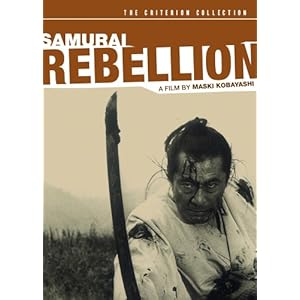
This one just seemed a bit too slow to me. I love Masaki Kobayashi's work (unfortunately I'm already almost out of films he made that are actually available), but Rebellion wasn't quite up to the power of Harakiri or the breathless scope of The Human Condition. It actually probably has roughly the same pace as Harakiri, and might even be quicker. But that film was coated in a pervasive, almost oppressive tension that seemed likely to snap into chaos at any second, and while Rebellion has a sad story, there just isn't that feeling. Toshiro Mifune was probably getting a bit old at that point to carry a whole movie on charisma alone (though he still handles the swordplay well), and Tatsuya Nakadi does a lot with his few scenes, but the character he plays is intentionally pretty neutral. It's a solid, no-nonsense samurai film, one that could have benefited from being pushed a little in either a darker or more fun direction.
Wednesday, July 20, 2011
Movie Update 11A
Life goes on, and I continue to watch a number of films that I have never seen before. I'm running out of "classics" in the instant queue at this point, and I don't know if I'm going to keep that when Netflix switches up the plans in a couple months. But I'll keep watching movies. 11B goes up tomorrow.
The Conversation

Sandwiched between the first two parts of The Godfather, Francis Ford Coppola made this film, a much more intimate and inward-looking affair. Gene Hackman does a great job (I find it amazing he was already 44 when this was made, but I hadn't realized he retired years ago either) as a surveillance expert who becomes worried by the content of a conversation he is hired to record, and reluctant to hand it over to his client. He's surrounded by a great cast, notably a young Harrison Ford as his main contact with the client, John Cazale as his spurned partner, and a brief appearance by Robert Duvall. It's mostly a character piece, and the script and Hackman's work do a great job of bringing a quiet by interesting man to life. Things do get hairier later on, with some surprisingly shocking moments as it reaches the climax. Nice anti-Hollywood ending, too.
The Hustler
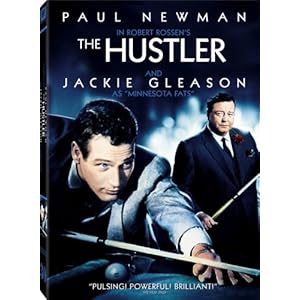
I feel like Paul Newman was sort of a singular talent that came into his own in the 60s, and since he didn't have any direct competitor like Robert De Niro versus Al Pacino, some people my age overlook how amazing of an actor he is. There's no ongoing debate around him, he's just an amazing actor. Could be making crap up, though. In The Hustler he plays a pool shark, and while there are extensive pool scenes in the movie, it's more about the turmoil of the character, who realizes he's not who he thought he was after a game against Jackie Gleason's Minnesota Fats goes bad. George C. Scott is also great in the movie, and it's just a fun film to watch despite some pretty dark material towards the end. The good kind of sports movie that's not really about sports.
MASH

All I really knew about Robert Altman before seeing this was he made movies with ensemble casts that talked over each other, and that's certainly the case here. It's a Korean war movie that's really about the Vietnam war, and showcases funny actors rather than comedians trying to act. The three main characters are military doctors played by Donald Sutherland, Elliot Gould, and Tom Skerritt who don't care much for proper chain of command or behavior for their positions. It's not really realistic how cavalier they are with their mistreatment of other officers in the movie, but it's a satire, and it works. I didn't think it was an amazing movie, but I did enjoy watching it go through its paces, and there are a number of memorable scenes, even if some don't quite pay off or go on too long. I can definitely see how some producers looked at it and saw a way to make a series out of it, after removing some of the racier stuff. I assume I'll continue to never see it, but you never know.
Play Time

One of those movies that I didn't really love, but I appreciated the immense amount of care and craft behind. It's hard to say what Jacques Tati's deal is, beyond a lot of wide shots filled to the brim with little bits of physical comedy in every corner of the screen. Play Time is a film where dialogue isn't very important, and I could easily see the whole thing working almost as well with no subtitles at all (it's already a mix of French and English), or even as a silent film. It's about a tragic future version of Paris, where all of the famous landmarks people love have been replaced with plain buildings filled with sterile cubic offices, steel floors and chairs with squishy cushions. Humanity still shines through though, as Monsieur Hulot and an American tourist bumble around the trade shows and turn a disastrous restaurant opening into a heck of a party. I think the whole thing could have greatly benefited from chopping as much as half an hour off, but there's nothing wrong with any individual scenes. You can just only take so much whimsy and clever visual comedy before it all seems like the same stuff. Still a solid film.
Monday, July 11, 2011
Bayonetta

It would be hard for a video game to be more ridiculous than Bayonetta without becoming intolerable. Plenty of games have gone in a similar direction with over-the-top action sequences and absurd stories and presentation, but I can't recall seeing one take it all as far as this game. It helps a lot that the game knows very well that it is ridiculous, and is sort of winking the entire time. Bayonetta is sort of the typical sexy bombshell protagonist that sometimes gets exploited, but her feminine proportions and the camera angles she's shot at are so insane that it's obvious her entire existence is tongue-in-cheek. It helps that she has such a delightfully wicked personality. But anyway, she's far from the only wacky thing in the game. The whole premise is that three different realities live on top of each other; basically Earth, heaven, and hell. Witches and sages serve the dark and the light, and they can travel between the realities. Bayonetta is a witch, and she kills the hell out of angels through the entire game in order to prevent someone from resurrecting God. The plot isn't that strange for a Japanese game, but the panache with which the world is brought to life and then repeatedly exploded is pretty exceptional.
I guess it speaks to how much I like God of War that I often like these kinds of stylish action games best when they remind me of it. I've had plenty of fun with the kinetic, desperate action of Devil May Cry and Ninja Gaiden, but that action is about all there is to them besides some silly cut scenes serving a boring plot. A lot of what I really like about God of War is how it invests you in all of the mayhem you cause by getting you on Kratos' side, and making the setting seem like it exists beyond the hallways and arenas you're fighting in. Both of those are definitely present in Bayonetta, along with the simple platforming sections and gigantic boss fights. All it's really missing are the interesting puzzle elements, with those bits usually boiling down to finding the right object to smash. It's still a game that focuses mostly on the combat, which is fine when it's as crazy and enjoyable as everything else about the game.
They do a good job of slowly expanding your options in battle - Bayonetta starts with a fluid and entertaining two-button combo system, an arsenal of fire four guns (two are strapped to her heels), the ability to slow down time for everyone else with a well-timed dodge (the complete absence of a block button means the combat is always fast paced and intense), and a magic meter that lets her use her hair for especially damaging blows or execute torture attacks, which are the baseline for the absurd brutality she puts her foes through. As the games goes on you pick up some new moves and weapons that expand your choices and keep things fresh. Unfortunately, the game was a bit too hard for me on normal after a certain point, and rather than replaying levels to pay for upgrades and items I opted to switch to easy mode. The game was still a lot of fun the rest of the way, but I felt like I was missing something - I didn't manage to find any new weapons after a certain point, and the way some things became automatic in that mode made it seem like I wasn't getting the full experience. Still, I appreciated the depth and smoothness of the combat, even if I didn't fully master it myself.
The regular fighting makes up most of the gameplay, but Bayonetta does find occasion to mix things up. The light platforming elements did the job of giving you a break from the insanity to observe the strange world the game takes place in, and there are a few opportunities to use vehicles in specific sequences that are their own brand of out of their mind. It's a tight eight hour experience, only really dragging towards the end when it seems like the game should have ended already and just won't. If an overly long denouement is the only real mistake caused by the game's everything-including-the-kitchen-sink approach, then the project is a remarkable success. The PS3 version of the game is famous for its technical inefficiencies, but I guess it's been patched enough to where it really isn't a major problem at this point. The loading times were generally fine, and while I did notice some slowdown, it only seriously impacted the gameplay in a single (large) room late in the game. Considering how much stuff was crammed in the game, I thought it was fine. It looks pretty nice too, though the use of mostly-still frames in certain cut scenes felt kind of cheap. The voice acting is marginal but Bayonetta herself is great, and the music works even if it's a bit repetitive. There also seems to be plenty of stuff in the game to extend its life beyond the initial play-through, especially if you're skilled enough to unlock it. At the price you can find it for now, Bayonetta is definitely one of this generation's best pure action games.
Saturday, July 9, 2011
Movie Update 10
A couple Best Picture winners, and a couple films that lost the award to Rebecca in 1940.
The Grapes of Wrath

I've always kind of wished I read more than one John Steinbeck book, and this didn't change that. I'm not sure how well John Ford's film translated the original story, but it's still a great movie especially because of the flavorful (especially for the 40s) dialogue and some outstanding performances. Henry Fonda is a good main character and Jane Darwell is good as the mother, and both deliver memorable speeches well. The best work though might be done by John Carradine as a former preacher who gets mixed up in the Joad family's journey. Somewhat depressing but worthwhile.
Midnight Cowboy

I usually like Dustin Hoffman, but strangely I thought he hurt this movie a little bit. His performance is generally fine, it's just the voice he puts on seems really fake and distracting. It's not too bad though, and Jon Voight is pretty outstanding in the real lead role. This is one of those movies that's full of stuff that's just wormed its way into the collective unconscious, and seeing it all play out was interesting. I found the story itself occasionally dull, though it begins and ends pretty well. It's a unique movie, and a solid one.
The Philadelphia Story

Jimmy Stewart and Cary Grant might be the two best leading men of the era, and putting them in the same movie with Katharine Hepburn, well... it's almost disappointing that the movie is just really good rather than a masterpiece. It's a solid romantic comedy if not actually a particularly funny one, with really good performances propelling a twisty little love story. It's just fun seeing all these people together, and it's just the old school Hollywood machine doing its thing well.
The Sound of Music
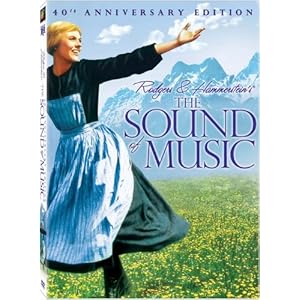
I liked this more than I expected I would, for some reason. Usually I don't go for this extremely family friendly kind of thing, but I don't know, it's just a pleasant experience. I almost didn't mind the nearly three hour running time. Nice songs, nice performances, nice message. Nice movie. Surprisingly funny, too. Plus it was entertaining spotting the tons of references from cartoons and other movies throughout.
Tuesday, July 5, 2011
The Elder Scrolls III: Morrowind
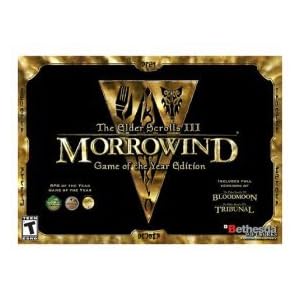
I've been slowly working my way through this game's main quest for just shy of three years now (you can check out my pretty much abandoned attempt at chronicling that here), and only really got in gear to finish it recently when it dawned on me that we're only four months away from the next Elder Scrolls game coming out. I didn't want it hanging over me when I dove back into that world. The funny thing is, despite "beating" the game, I've barely scratched the surface of what's available, especially if you include its two expansions. I finished the main quest, I made some advances in a couple guilds, I did a bit of side questing, but there are entire factions I never interacted with and whole regions I didn't really explore. This series is known for its hugeness, and Morrowind certainly doesn't disappoint in that regard. I'd like to at least finish the main quests for the expansions at some point, but even if I don't, I sank a lot of hours into the game without coming close to running out of stuff to do.
Comparing Morrowind with The Elder Scrolls IV: Oblivion, the sequel that came out four years later, it's easy to see what was improved and what took a step back in the name of user friendliness. Most of the gameplay in Morrowind feels pretty archaic at this point - you still have the ability to wield a variety of weapons and magic powers, but it's more awkward to select what you want to use, and the combat itself is amazingly archaic. There are a few different attack types, but all they seem to do is provide different advantages based on the type of weapon, and fighting someone (or something essentially boils down to repeatedly clicking on and hoping the numbers say you got a hit. There can be a lot of planning and strategy in one of the more difficult encounters - rarely have I put as much thought into what potions or scrolls I'll use before I rush into battle in other games. It still feels kind of crummy though, especially when 2002 really wasn't that long ago (though it was closer when I started playing).
This gameplay simplicity is felt in the quest design as well. There's a richness to Morrowind's world, with many different groups representing very different ideas, all having opinions about each other. Most NPCs have a ton of dialogue, unvoiced and occasionally shared but well written, and you can find out a lot just by asking. As far as the quests I actually did though, all of that flavor didn't have much impact on what I was actually asked to do. You spend your time tracking down monsters, recovering items, and talking to people, and not much of gets more interesting than that. I didn't find much as instantly compelling as the more memorable quests from Oblivion, where you're solving a mystery or being transported to another plane of existence. I won't complain about the fact that the quests hold your hand a lot less than in the sequel, because pretty much everything you need to know is there to find if you're inquisitive enough. There's no markers telling you where to go on the map, the journal is more of a log on what you know than instructions on what to do next, and you can only jump from one part of the map to another by paying someone to transport you. It can lead to frustration if you just want to get things done without puzzling out yourself what comes next. But it's not really a game for people who have no curiosity, the whole point of the game is sort of to uncover things at your own pace.
The presentation of the game is acceptable, though it's hard to say how it fared at the time. Other games definitely run smoother with better quality visuals, but Morrowind gets a lot of credit for its scale. As I mentioned the voice acting is limited to brief snippets when you approach a character, but it works well enough to sell the setting, and the music is nice without being too explosive, plus it's useful when it changes up to let you know when an enemy is near. The sound effects are pretty basic, but they're also functionally useful. Unfortunately the game is pretty messy technically. Even though it came out years ago, it still has stability problems, crashing more often than you'd like for a game that could stand to autosave a bit more often. There's some awkwardness in the game engine too, with lots of NPCs and monsters having difficulty finding their way over to you. Cliff Racers are already incredibly annoying, when you combine that with the game's troubles getting them to fly to you correctly, you have one of the worst game enemies of all time.
In any case, I wanted to get a taste of Morrowind, the predecessor of one of my favorite games ever made, and in the end I definitely got that. I didn't find it to generally be nearly as fun to actually play for hours on end, but there is something unique about the game that I think I appreciated. The main quest is certainly more interesting from a conceptual perspective than Oblivion's, for a start. Just wandering around a city at night, looking up at the vivid sky of Tamriel, searching for the next person who will help you keep moving forward, you realize the great job they did creating a sense of place that most games even now sometimes struggle with. I would love to see the detail of Morrowind enhanced by enjoyable gameplay like Oblivion's. Hopefully The Elder Scrolls V: Skyrim can come close to doing that this November.
Monday, July 4, 2011
Treme - Season 2

Treme's second season expands on the scope of the show a bit while staying true to its roots, trying to show a complete picture of post-Katrina New Orleans and its many colorful inhabitants. The whole cast is back except for the ones who obviously wouldn't be, a couple characters get meatier roles (including David Morse as the cop friend of Melissa Leo's Toni, who deals most directly with the show's increased focus on crime), and Jon Seda from The Pacific shows up to kickstart a new plotline involving the city's attempt to rebuild and the seedy things that go into it.
If you didn't like the first season, you won't like the show now. It has the same natural feel, where characters go through their lives and something dramatic isn't really guaranteed to happen. There are a couple shocking moments beyond anything from the first season in keeping with the theme of crime returning to the city as it recovers, but they're rare and not what the show is about. There's also the same amount of extended scenes with live music, and if you don't like the kind of songs they play... well, it can be a hard show to watch. I do think there's enough variety of style that there's usually at least a couple songs I like per episode, though I occasionally wish they got less screen time, so the show would go by a bit quicker.
Being the second season, the show does branch out just a bit and have a few characters spend time away from the city. Del continues to hop back and forth between NO and New York, but this time his father comes along, and Janette is also in the city, with a story about being a cook there that feels mostly separate from the rest of the show but is still pretty interesting, even if you don't watch the Food Network. The writers also managed to miraculously save Sonny, having him clean his act up by working a fishing boat. I like the way the show avoids typical dramatic story beats with its characters, having developments that would usually go one way turn out another, more realistic and somehow more satisfying way. I won't go through every single character, but the show did a great job of continuing to intertwine all their lives, and the series is getting to the point where watching a new episode is like spending time with old friends and family. Treme will never be the amazing, game changing drama that The Wire was, but as a portrait of an interesting place tinged with political ideas without being overwhelmed by them, it is a very good show on its own. I look forward to season three.
Sunday, July 3, 2011
Trailer Park Boys: Countdown to Liquor Day
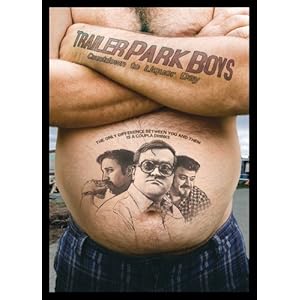
Unlike Trailer Park Boys: The Movie, Countdown to Liquor Day is actually in continuity with the series and continues the story, wrapping it up once and for all. It's kind of hard to keep making sequels when the main characters implore the people with the cameras to fuck off already. I liked this more than the previous movie, though not as much as the series itself. A lot of its strengths are on full display, with the main characters as strong as ever and some great comic moments you wouldn't find anywhere else. You just don't usually see this much urination involved in a high speed car chase. Considering that this is apparently the last hurrah for the series, I expected more characters to show up - there's no Cory and Trevor, no Barb, no antagonists besides Mr. Lahey. Several minor characters do pop up here and there in cameo appearances, but I would have liked a bigger, more involving story. The dynamics that are still in place are good though, and it's a solid goodbye for most of the characters.
Like I said though, I didn't enjoy it as much as the show, and there are a few reasons. There aren't enough new people around. There's only a couple new characters with any real screen time, and none of them really make lasting impressions or even have a single memorable line. This leads to the story revolving around the boys versus Lahey yet again, and frankly, while they still find good material there, I'm just a bit tired of it at this point. Hey look, they're butting heads, and Lahey's getting extremely drunk again. The second act of the film definitely seems to drag a bit, and I wish things just got mixed up a little more than they did. You can only go back to the exact same beats so many times. The climax is exciting and funny, I just wished there was a bit more invention to these characters' farewells.

































